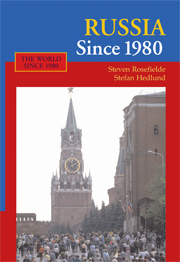Conclusion
Published online by Cambridge University Press: 05 June 2012
Summary
Russia seizes defeat from the jaws of success! This is the headline of the past twenty years, which seemed to begin so auspiciously with Mikhail Gorbachev's perestroika. Having destroyed communism and the Soviet Union in a fit of inadvertence without a civil insurrection or foreign invasion, the Kremlin had a golden opportunity to place Muscovite authoritarianism behind it. However, Boris Yeltsin flinched and Vladimir Putin restored Russia's imperial martial police state. It didn't have to end this way. Things could have been different at every turn. If the Politburo had chosen Grigory Romanov over Gorbachev in March 1984 or had the organizers of the August 1991 coup d'etat liquidated Yeltsin, the Soviet Union would have reverted to the Brezhnev mold. If the military had sided with Alexander Rutskoi instead of Yeltsin, parliament would have triumphed over the tsar. If there had been no 9/11, there would have been no petro bubble to pull Putin's chestnuts out of the fire.
Life is strewn with what-ifs. A similar list of contingencies can be prepared for every passage of Russian history since Ivan the Great. What is striking about Muscovy is its unfailing ability to foil westernization. Despite innumerable opportunities, it always finds ways to stay the Muscovite course, rather than transition to democratic free enterprise, or European Union social democracy. Consequently, not only are its leaders wedded to inefficient rent-granting and bloated militaries, but they also subordinate the rule of law to the rule of men and civil rights to expediency.
- Type
- Chapter
- Information
- Russia Since 1980 , pp. 271 - 274Publisher: Cambridge University PressPrint publication year: 2008



